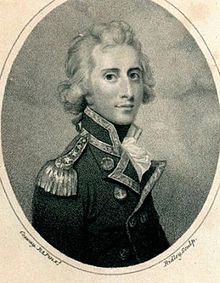Charles Edmund Nugent
| Sir Charles Edmund Nugent | |
|---|---|

Sir Charles Edmund Nugent
|
|
| Born | c.1759 |
| Died | 7 January 1844 Studland, Dorset |
| Allegiance |
|
| Service/branch |
|
| Years of service | 1771–1844 |
| Rank | Admiral of the Fleet |
| Commands held | |
| Battles/wars | |
| Awards | Knight Grand Cross of the Hanoverian Order |
| Relations |
|
Admiral of the Fleet Sir Charles Edmund Nugent GCH (c.1759 – 7 January 1844) was a Royal Navy officer. He saw action as a junior officer in the 50-gun Bristol at the Battle of Sullivan's Island during the American Revolutionary War. He was held as a prisoner-of war for a day by Spaniards shortly before the Battle of San Fernando de Omoa later on in the War.
Nugent served in the naval brigade in the invasions of Martinique, Saint Lucia, and Guadaloupe during the French Revolutionary Wars and, when William Cornwallis assumed command of the blockade of Brest, Nugent was selected to serve as his Captain of the Fleet during the Napoleonic Wars. He never commanded any fleet or naval station but did rise to the highest rank in the Navy.
He was the son of Lieutenant Colonel the Honourable Edmund Nugent, the only son of Robert Nugent, 1st Earl Nugent, but after his father's death in 1771 his marriage was found to have been illegal, and he and his elder brother George were declared illegitimate, and thus unable to inherit any of his grandfather's titles.
Nugent entered the Navy as a youngster in 1771, serving aboard the sloop Scorpion, commanded by George Elphinstone (later Viscount Keith) until 1774. He then served aboard Trident, flagship of Sir Peter Denis, in the Mediterranean.
...
Wikipedia
